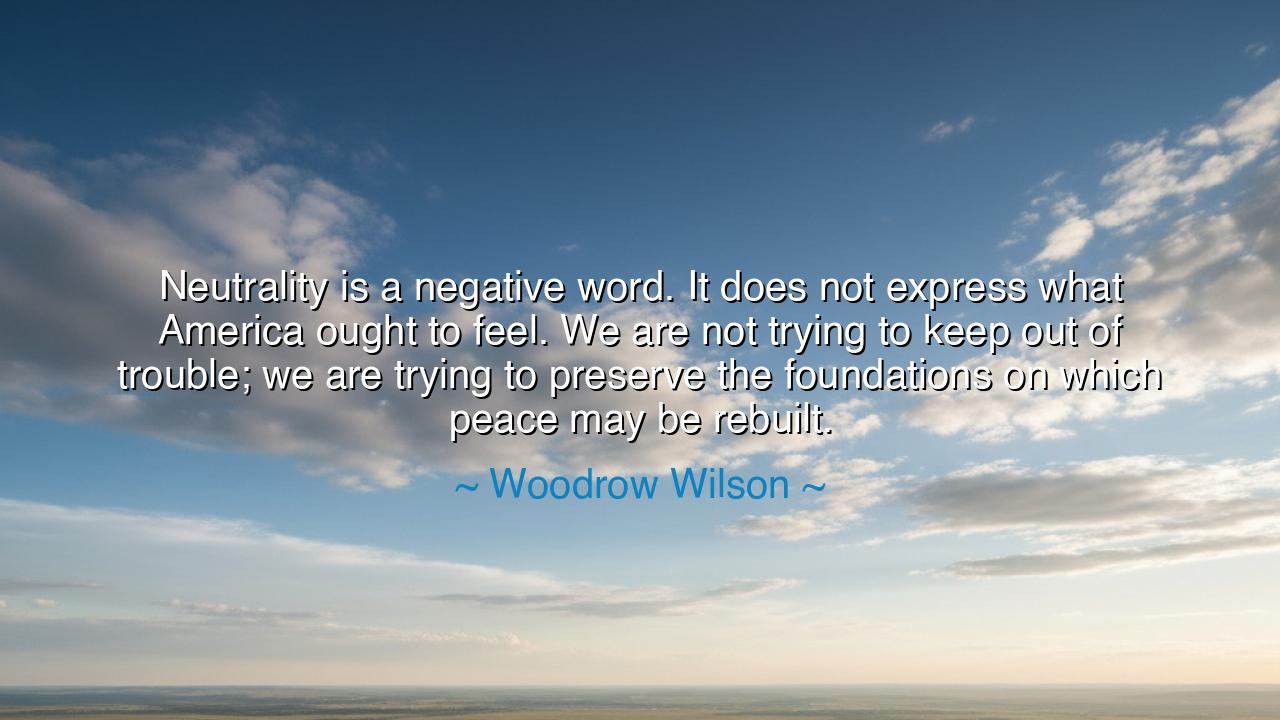
Neutrality is a negative word. It does not express what America
Neutrality is a negative word. It does not express what America ought to feel. We are not trying to keep out of trouble; we are trying to preserve the foundations on which peace may be rebuilt.






Hear, O children of destiny, the solemn words of Woodrow Wilson: “Neutrality is a negative word. It does not express what America ought to feel. We are not trying to keep out of trouble; we are trying to preserve the foundations on which peace may be rebuilt.” These words arose not in times of calm, but in the storm of the First World War, when nations bled and the fate of the world trembled. Wilson’s cry was more than a political statement; it was a vision that neutrality, though safe in appearance, cannot be the guiding light of a nation when the very foundations of peace are at stake.
The origin of this wisdom lies in the early years of the Great War, when America watched from across the sea as Europe was engulfed in blood and ruin. Many voices clamored for isolation, for the comfort of remaining untouched. Yet Wilson saw deeper: that neutrality, if it meant indifference, was not strength but weakness, not vision but blindness. For he believed that nations, like men, are called not merely to avoid trouble, but to act as guardians of justice, builders of peace, and stewards of the moral order upon which humanity depends.
The ancients themselves echoed this truth. In the days of Greece, when Persia threatened all the cities, those who sought neutrality were not praised but scorned, for their silence endangered all. In the days of Rome, allies were expected to stand in defense of shared values, for neutrality in the face of tyranny was seen as betrayal. Wilson, though modern, spoke in this ancient tongue: neutrality is not enough when the world itself burns; one must stand to preserve the foundations upon which peace can be rebuilt.
Consider the story of America’s eventual entry into the First World War. For years, the nation hesitated, clinging to neutrality. But as the war dragged on, as injustice spread, as the seas became battlegrounds where innocent lives were lost, neutrality proved impossible. When at last America entered, it was not to seek conquest, but to help build a new world order, one Wilson envisioned in his Fourteen Points, a framework for reconciliation and cooperation. Though his dream was not fully realized, his vision revealed the deeper meaning of his words: neutrality cannot preserve peace; only active labor for justice can.
History itself shows the peril of neutrality. In the Second World War, many nations sought to remain aloof as fascism spread. Yet silence and inaction gave tyranny the ground to grow stronger. Only when nations united, setting aside neutrality, was the tide turned. Thus, time and again, we learn the lesson: neutrality in the face of evil is not virtue but surrender. True peace can only be secured by those willing to defend the foundations of liberty, justice, and human dignity.
The meaning of Wilson’s teaching is clear: peace is not passive, but active. It is not preserved by standing aside, but by standing firm. To “keep out of trouble” is not enough, for in the end, trouble comes to all who ignore it. What matters is whether one has worked to lay down the stones upon which peace may later be built. To preserve peace is to take responsibility for the future, to act with courage today so that tomorrow may hold harmony.
Practical wisdom flows from this. In our lives, neutrality in the face of injustice, cruelty, or oppression allows darkness to spread unchecked. We must instead commit ourselves to defending what is good, to speaking truth when silence is easier, to laboring for reconciliation where division reigns. Just as nations must preserve the foundations of peace, so must individuals preserve them in their own circles of influence. Every act of justice, every defense of the weak, every word of truth spoken against falsehood strengthens the foundation on which peace is built.
So remember, O listener, the charge of Woodrow Wilson: neutrality is a negative word when the soul of humanity is at stake. Do not strive merely to avoid trouble; strive to preserve the very ground upon which peace may be restored. For peace is not the absence of conflict, but the presence of justice—and only by acting with courage, even in times of peril, can we ensure that peace will endure for generations yet unborn.






AAdministratorAdministrator
Welcome, honored guests. Please leave a comment, we will respond soon